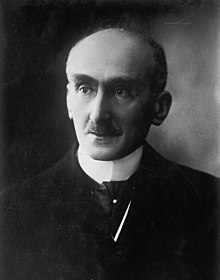Bergson
| Henri-Louis Bergson | |
|---|---|

Bergson in 1927
|
|
| Born |
18 October 1859 Paris, France |
| Died | 4 January 1941 (aged 81) Paris, France |
| Nationality | French |
| Alma mater |
École Normale Supérieure University of Paris |
| Awards | Nobel Prize in Literature (1927) |
| Era | 20th-century philosophy |
| Region | Western Philosophy |
| School |
Continental philosophy French Spiritualism Philosophy of life |
| Institutions | Collège de France |
|
Main interests
|
Metaphysics, epistemology, philosophy of language, philosophy of mathematics, studies of immediate experience |
|
Notable ideas
|
Duration, intuition, affection, élan vital, open society |
|
Influenced
|
|
Henri-Louis Bergson (French: [bɛʁksɔn]; 18 October 1859 – 4 January 1941) was a French philosopher, influential especially in the first half of the 20th century and after WWII in continental philosophy.
Bergson is known for his influential arguments that processes of immediate experience and intuition are more significant than abstract rationalism and science for understanding reality. He is also known for having engaged in a debate with Albert Einstein about the nature of time, a debate which eventually contributed to a partial diminishment of Bergson's reputation, until most of his fundamental contributions to French Philosophy were vindicated by the discovery of Quantum Physics.
He was awarded the 1927 Nobel Prize in Literature "in recognition of his rich and vitalizing ideas and the brilliant skill with which they have been presented". In 1930 France awarded him its highest honour, the Grand-Croix de la Legion d'honneur.
Bergson was born in the Rue Lamartine in Paris, not far from the Palais Garnier (the old Paris opera house) in 1859. His father, the pianist Michał Bergson, was of a Polish Jewish background (originally bearing the name Berekson). His great-grandmother, Temerl Bergson, was a well-known patroness and benefactor of Polish Jewry, especially those associated with the Hasidic movement. His mother, Katherine Levison, daughter of a Yorkshire doctor, was from an English and Irish Jewish background. The Bereksohns were a famous Jewish entrepreneurial family of Polish descent. Henri Bergson's great-great-grandfather, Szmul Jakubowicz Sonnenberg, called Zbytkower, was a prominent banker and a protégé of Stanisław August Poniatowski, King of Poland from 1764 to 1795.
...
Wikipedia
